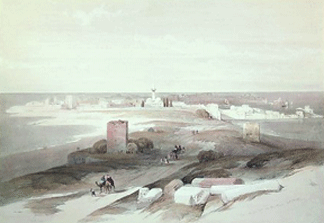
[Illustration: “Tyre, from the Isthmus” by David Roberts]
The Lebanese port city of Tyre has seen the wrath of the IDF. Many villagers fleeing the unrelenting bombing in the south fled to Tyre as a safe haven, only to find that the leaflets dropped from the sky lied. There is no peace in Tyre. Perhaps the message dropped should have been purely biblical, Psalm 83 for example. Most Christians in American can recite a line or two from the 23rd Psalm, the idyll of the good shepherd and a message of hope. It is oft read from the pulpit. But when was the last time you read Psalm 83.
Allow me to quote this psalm in the old style King James English:
1 Keep not thou silence, O God: hold not thy peace, and be not still, O God.
2 For lo, thine enemies make a tumult; and they that hate thee have lifted up the head.
3 They have taken crafty counsel against thy people, and consulted against thy hidden ones.
4 They have said, Come, and let us cut them off from being a nation; that the name of Israel may be no more in remembrance.
5 For they have consulted together with one consent: they are confederate against thee.
6 The tabernacles of Edom, and the Ishmaelites; of Moab, and the Hagarenes;
7 Gebal, and Ammon, and Amalek; the Philistines with the inhabitants of Tyre;
8 Assur also is joined with them: they have holpen the children of Lot. Selah.
9 Do unto them as unto the Midianites; as to Sisera, as to Jabin, at the brook of Kison:
10 Which perished at En-dor: they became as dung for the earth.
11 Make their nobles like Oreb, and like Zeeb: yea, all their princes as Zebah, and as Zalmunna:
12 Who said, Let us take to ourselves the houses of God in possession.
13 O my God, make them like a wheel; as the stubble before wind.
14 As the fire burneth a wood, and as the flame setteth the mountain on fire;
15 So persecute them with they tempest, and make them afraid with thy storm.
16 Fill their faces with shame; that they may seek thy name, O Lord.
17 Let them be confounded and troubled forever; yea, let them be put to shame, and perish:
18 That men may know that thou, whose name alone is Jehovah, art the Most High over all the earth.
Roll over Nostradamus. If you love the Da Vinci Code, you will adore this psalm. It is almost as though this is a prophecy of the latest offensive (or the ones before, for those with historical memory). Here we have the non-Gospel version of “do unto them.†Modern missiles easily substitute for mountains set on fire in Solomon’s time. Surely the residents of southern Lebanon or the southern suburbs of Beirut might as well be dung, which is for current Israeli policy a synonym for Hizballah.
Woe is Tyre, it would seem, no matter what the era. And this is the tragedy of biblical proportions. On CNN a few days ago there were video clips showing carloads of orthodox settlers encouraging the Israeli army troops, no doubt singing a psalm like this one. And over the border similarly aggressive religious rant in Arabic mingled with the tears and cries of mourning for the dead. Forget for a moment the blame game and the litany of atrocities on both sides. Fill with shame all the faces of those who thinks guns and bombs resolve conflict. Instead I suggest we all chant a much more pragmatic prayer from Psalm 94:1: “O Lord God, to whom vengeance belongeth; O God, to whom vengeance belongeth, show thyself.†Why can’t we leave the vengeance to this God who certainly is not showing himself in the hills of Galilee and Lebanon these days.
Daniel Martin Varisco